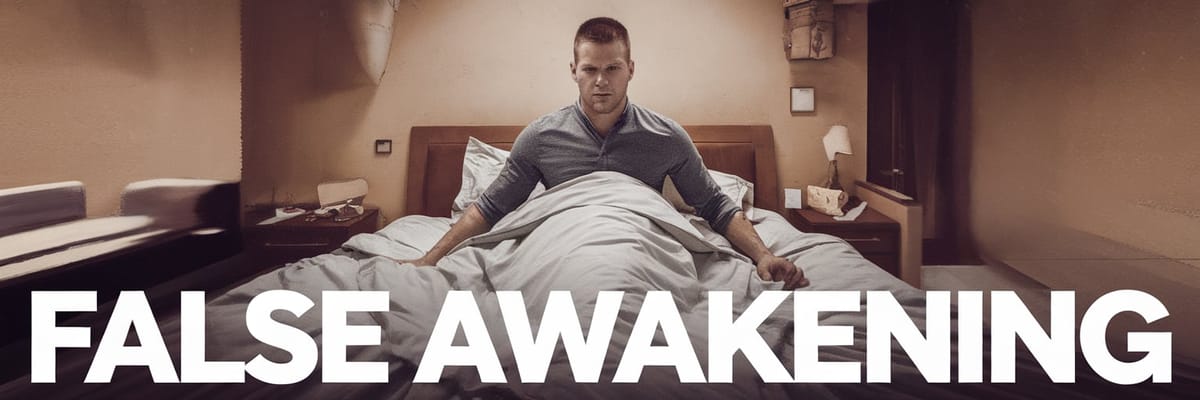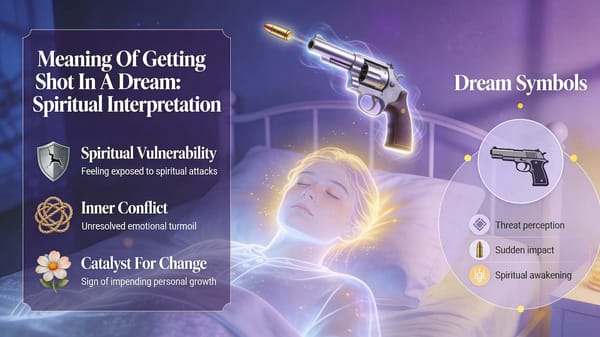False Awakening: Understanding and Overcoming Lucid Dream States

Imagine waking up, feeling the crisp morning air, getting out of bed, and beginning your day, only to realize moments later that you're still dreaming. The walls of your reality twist, and once again, you must peel away the layers of your slumber. Experiencing a false awakening is a disconcerting experience, a reflection of the thin veil between our conscious world and the subconscious mind. Across cultures and time periods, false awakenings occupy a persistent and mysterious place, drawing curiosity and fear alike. These dreams symbolize our complex relationship with reality, prompting us to question the nature of consciousness itself.
What do they really mean? Let’s explore the symbolic, psychological, and scientific interpretations of this intriguing dream.
The Symbolic and Spiritual Significance of Experiencing False Awakenings
False awakenings transport us into a dimension where reality feels tangibly close but is deceptively distant. Symbolically, they invite us to explore themes of independence and mystery. The dream acts as a mirror to our intuition and our often unfathomable subconscious, suggesting areas in our life where we may be deceiving ourselves or harboring false beliefs. Spiritually, such dreams can be interpreted as a call for enlightenment, pushing us to peel back the layers of our perceived truths to discover deeper, more authentic insights.

What Do Different Experiencing False Awakening Scenarios Mean?
Experiencing false awakenings can unfold in various ways, each carrying its own unique implications:
- Reluctant Awakening: You may feel hesitant to leave the dream, signifying resistance to facing certain current life issues. This scenario may highlight reluctance towards change or acceptance.
- Multiple False Awakenings: Being trapped in a loop of continued false awakenings could reflect anxiety or confusion in waking life, with the dream acting as a metaphor for your cyclical struggles.
- Fear or Discomfort: If your false awakening is imbued with fear or discomfort, this may point to unresolved fears or traumas in your waking life. The dream urges you to confront these feelings, allowing them to surface rather than hide in the recesses of your mind.

Psychological Interpretations of Experiencing False Awakenings
From a psychological perspective, false awakenings offer rich insights:
- Freudian Interpretation: Sigmund Freud might argue that these dreams manifest latent desires and repressed emotions. The dreamer grapples with hidden feelings that surface in this twilight zone of consciousness.
- Jungian Analysis: Carl Jung would likely view this type of dream as archetypal, a journey into the shadow self. The dream serves as a metaphorical process of individuation, encouraging the dreamer to integrate unacknowledged parts of themselves.
- Reiki-Styled View: From a Reiki standpoint, false awakenings might represent energetic imbalances. They could signal blockages in spiritual energy, urging the dreamer to seek harmony and balance in life.
Common Causes and Factors Behind Experiencing False Awakenings
Several triggers can lead to false awakenings:
- Stress: High stress levels can catalyze these dreams, blurring the boundaries between consciousness and illusion.
- Significant Life Changes: Transitions, both anticipated and unexpected, often provoke dreams where one questions their reality.
- Health Anxieties: Concerns about physical well-being might manifest as false awakenings, drawing attention to subconscious fears.
- Emotions of Loss or Jealousy: Unresolved emotions of loss or jealousy can materialize in dreams, urging the dreamer to confront these lingering tensions.
Scientific Explanations for Experiencing False Awakenings in Dreams
Science explores false awakenings through several fascinating lenses:
- Sleep Stages: False awakenings typically occur during REM sleep, where dreams are most vivid. Disruptions or anomalies in this phase can lead to this phenomenon.
- Neurological Factors: Brain activity is notably heightened during false awakenings, suggesting neurological factors at play, like abnormal electrical activity in specific brain regions.
- Physical Sensations: External stimuli (like sounds or physical discomfort) might invade our dream space, creating the illusion of awakening within the dream narrative.

Coping Strategies for Experiencing False Awakenings in Dreams
Navigating the labyrinth of false awakenings can be challenging, but the following strategies may help:
- Dream Journaling: Keeping a journal can create awareness and dispel the discomfort of these dreams. Documenting dreams can clarify their nature and uncover patterns.
- Professional Counseling: For recurring or distressing experiences, consulting a therapist or dream analyst can provide valuable insight and alleviate anxiety.
- Lifestyle Adjustments: Enhancing sleep quality through consistent routines, stress reduction techniques, and meditation can soothe mind and body, lessening the likelihood of false awakenings.
Summary & Final Thoughts
Experiencing false awakenings takes us on a journey through the veiled realms of the subconscious, challenging our perception of reality and consciousness. They serve as a profound metaphor for self-discovery, demanding introspection and inviting us to confront repressed emotions and assumptions. These dreams remind us that our inner worlds are complex tapestries, woven with deep truths and hidden desires. Through reflection and understanding, they offer the potential for great insight and personal growth, urging us to decipher life's mysteries, not just in our dreams but in the waking reality they mirror.
FAQ: Interpreting False Awakening Dreams
What is a false awakening in a dream?
A false awakening is a phenomenon where a person dreams about waking up and going about their daily activities, only to realize, either in the dream itself or upon a real awakening, that they were dreaming. This type of dream can blur the lines between the dream world and reality.
What is the symbolic significance of experiencing false awakenings?
Symbolically, false awakening dreams often represent levels of awareness, suggesting a need for deeper consciousness or introspection. They can symbolize the exploration of life illusions or self-deception, underlining themes of independence or unresolved issues.
What do different false awakening scenarios signify?
- Reluctant Awakenings: Might indicate a reluctance to face reality or a resistance to change.
- Repeated False Awakenings: Could represent feelings of monotony, lack of control, or unresolved issues.
- Awakening with Fear or Discomfort: Usually suggests the presence of suppressed fears, anxieties, or unresolved traumas.
How do psychologists interpret false awakenings?
- Freudian View: Freud might suggest false awakenings represent repressed desires or anxieties, reflecting unfulfilled wishes or latent fears.
- Jungian Perspective: Jung could see these dreams as symbols of individuation and the exploration of the subconscious.
- Reiki/Energy Perspective: Might consider these dreams as representing energy imbalances within the individual's chakras or energy field.
What are the common causes behind false awakenings?
Common causes for experiencing false awakenings can include high levels of stress or anxiety, major life transitions, unresolved emotional conflicts, or disrupted sleep patterns.
What scientific explanations exist for false awakenings?
False awakenings can occur during the REM phase of sleep, known for active brain activity and vivid dreaming. They could also arise from the intrusion of waking physical sensations or environmental stimuli into dream content, creating the illusion of waking up within the dream.
What strategies can help cope with false awakenings?
Coping strategies for managing false awakenings include keeping a dream journal to track patterns and emotional themes, seeking professional counseling or therapy for troubling dream experiences, implementing relaxation techniques or mindfulness practices, and establishing healthy sleep habits to promote restful sleep.
How do false awakenings contribute to personal growth?
Experiencing false awakenings can foster introspection and self-awareness. These dreams challenge conventional understanding of reality and subconscious processes, prompting individuals to explore deeper layers of self-knowledge and personal growth. Reflecting on these dreams can encourage emotional processing and unveil hidden truths about self and life experiences.




